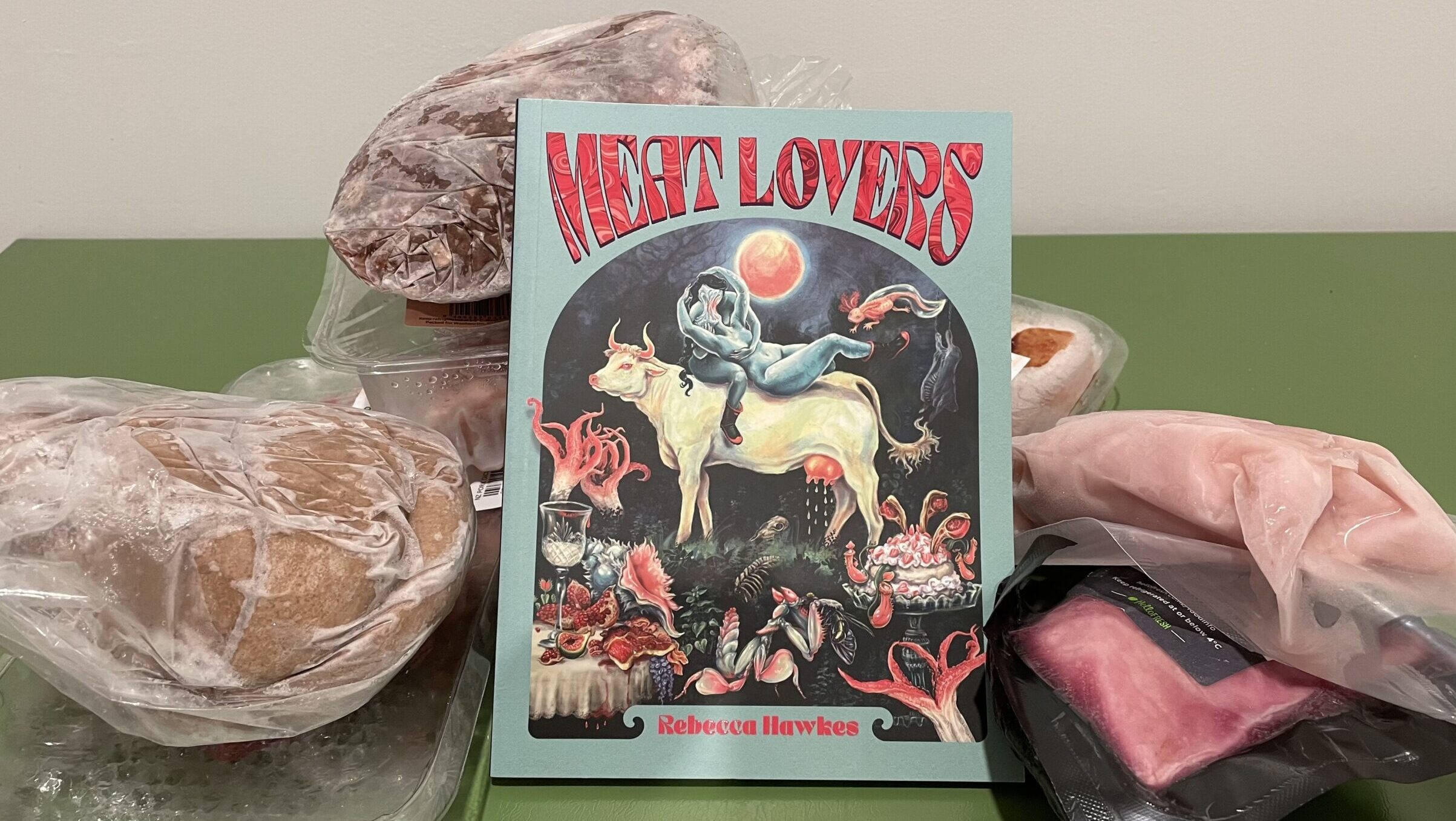Immediately upon purchasing this book I knew I had to cherish it, because I could only read it for the first time once. It sat on my bedside table with its other colleagues of unread books for several weeks, before a lone and finally chill Saturday night presented itself. Happily, I devoured this book in one sitting, eagerly turning each page for more.
Meat Lovers is a collection of poems written and beautifully illustrated by Rebecca Hawkes, a poet who grew up on a sheep and beef farm near Methven, but now lives in Wellington. The book is split into two halves, the aptly named Meat and Lovers, and the inspirations from the respective cities are rife through each half. Each poem mixes the wonderfully absurd and the beautiful in ways that will haunt and inspire its readers.
The first section, Meat, covers experiences from and inspired by Hawkes’s childhood on said sheep and beef farm. I wish I could say the poems in this section did not break my heart, but perhaps it is a wonderful thing to read such moving poetry. Lines including ‘when I stared into the abyss, it gazed back with bovine eyes’ (“After the blizzard I follow my mother”) help root these poems in their landscape of the farm, painting a childhood of hard work and intense imagination. But the lines that stand out to me the most are the ones that harrow and demand a moment of the reader’s pain.
In the poem “The Protagonists” Hawkes recalls an intensely imaginative friendship that falls apart. Hawkes balances the wonder of their imaginings and the heartbreak of being left behind so seamlessly, it hits the reader like a sucker punch. ‘It so happened I had more / and more lunchtimes to myself’ struck me as such a simple but effective representation of her grief.
The similarly heartbreaking “Is it cruelty” asks if putting a hurt animal out of its misery is cruel. This poem was the stand-out of the book for me, easily juxtaposing the subject matter with the narrator and her friend’s child innocence, all against the setting of a sprawling New Zealand farm. ‘If they are already marked by the gorse etching / blood dialect on their shins’ the poem begins to ask, before taking you down a path you are not likely to forget.
It is in the second half of the book, Lovers, that we see Hawkes all grown up. She presents as a young adult navigating city life for the first time, treasuring quiet moments with her loved ones. We see the grown up child from “The Protagonists in Werewolf in the girls’ dormitory”, which follows on thematically: ‘nobody wants the werewolf. creep, / freak, predator, monster. so why do you want to / be found out?’ That ache of wanting to be loved for all you are and all you desire is so pertinent even in this line alone. It is moments like this that build together the heart of the book. I cannot represent it aptly enough without displaying the entirety of these poems; all I can do is entreat you to buy and read this book.
The incredibly named “Lesbian vampire film theory” sees its narrator in love, spinning small moments of affection into grandiose and all-consuming declarations of love. ‘sluttish unsubtle I am tossing assorted clefty stonefruits at you’ she croons in the third stanza, a sentence that made me holler with joy.
Another theme that runs through not only this collection, but the whole sprawling world of Hawkes’s poetry is the simple beauty of nature. In the closing poem, “Depth imperative”, she writes ‘elvers slivering homeward up the last clean catchments / to lurk in the shade of trailing ferns.’ I want to be here, at the waterside, watching the young eels resplendent in the water. All of the animals in these poems are shown to be what they are: effortlessly beautiful and deserving of nothing but awe.
In short, this book is an incredible debut from a poet who has earned her praise. I felt seen and represented within this book, having been an imaginative child forced to grow up to accommodate the norms of society. I saw my queerness and weirdness praised by similar experience. If a book could be a hug, albeit a weighty hug, it would be this one.



